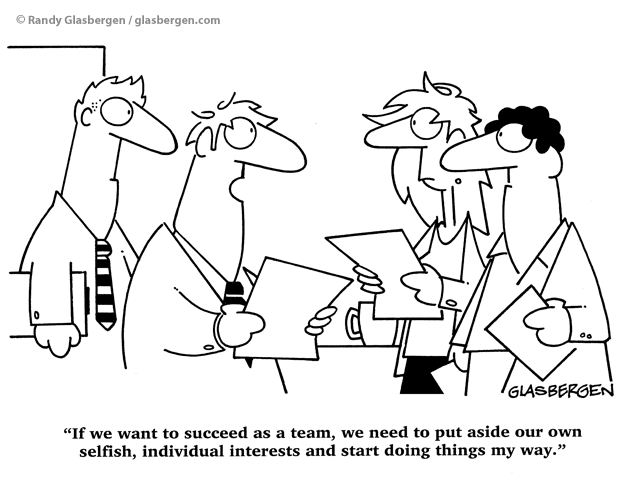
|
http://www.patrickmckenna.com/blog
Page << Prev 30 31 32 33 34 35 36 37 38 39 Next >> of 95
Post #611 – Thursday, June 14, 2012
Thought-Provoking Management Metrics - Part Two
 A few months back (Post #604) I wrote about how, at a recent gathering of the profession, one discussion centered around metrics – financial and performance-oriented measures. While we are all familiar with the usual billable hour, collections, matter profitability, and so forth, this discussion provoked me to think about some of the more unfamiliar and unorthodox, but vital metrics that I believe law firm management should be looking at. A few months back (Post #604) I wrote about how, at a recent gathering of the profession, one discussion centered around metrics – financial and performance-oriented measures. While we are all familiar with the usual billable hour, collections, matter profitability, and so forth, this discussion provoked me to think about some of the more unfamiliar and unorthodox, but vital metrics that I believe law firm management should be looking at.
In the first part of my article, I presented two useful metrics: management time spent exploring new opportunities and the number of new revenue ideas, practice areas and/or services launched in the past year. In this second part, we now have a look at defining distinctive attributes that clients value, time invested growing know-how, and effectiveness of meetings.
To read the complete article - download the PDF.
The above represents my latest column for Slaw.ca Slaw identifies itself as “a cooperative weblog on all things legal.” Slaw has been publishing for five years and gets 30,000 unique visitors and about 100,000 visits every month. For the past two consecutive years it has been the winner of three different awards as the best legal blog. I’m honored to have been asked to become a regular columnist and invite you to comment on my latest meandering.
Rant #610 – Friday, June 1, 2012
Sliced Too Thin
 Often viewed as a shortcut to success, wide disparities in pay, like those at Dewey & LeBoeuf, are instead destabilizing firms. Often viewed as a shortcut to success, wide disparities in pay, like those at Dewey & LeBoeuf, are instead destabilizing firms.
My latest, the third in a series of co-authored articles with Ed Reeser, is now appearing in the newest issue of American Lawyer magazine. Ed and I outlined this piece initially in September of 2011, but did not get the "go" until early January, completed the piece in February, and then it has been going through the typical "percolation" with the publisher (no complaint, we all know that is just the way the process flows) ever since. With the "Demise that is Dewey" this article became more than a little topical even though it was written entirely without any focus on that firm. (A passing reference to Dewey was added just before release). But if the tools and approaches are trotted out and applied to Dewey . . . there are some very strong warning messages that apply directly to that business model they used.
http://www.americanlawyer.com/PubArticleTAL.jsp?id=1202555054180&Sliced_Too_Thin
Rant #609 – Tuesday, May 22, 2012
Can Law Firm Leaders Avoid Being Willfully Blind?
 Margaret Heffernan's book, Willful Blindness: Why We Ignore the Obvious at Our Peril, examines the dynamic forces that contribute to ignoring what is right in front of us. Margaret believes that knowing what contributes to willful blindness can help us prevent it, so I wondered how many of the common threads Margaret discovered were applicable to the legal space, that is, law firm partners, law firms and other legal professionals. What contributes to willful blindness? Margaret Heffernan's book, Willful Blindness: Why We Ignore the Obvious at Our Peril, examines the dynamic forces that contribute to ignoring what is right in front of us. Margaret believes that knowing what contributes to willful blindness can help us prevent it, so I wondered how many of the common threads Margaret discovered were applicable to the legal space, that is, law firm partners, law firms and other legal professionals. What contributes to willful blindness?
1. Multi-tasking: It is a neuroscientific fact that the brain cannot multi-task. If you're paying attention to one thing, you're not paying attention to something else. Are we really listening attentively or are other tasks getting in the way of hearing and seeing what is right in front of us?
2. Fatigue: As we get tired, glucose goes toward the part of the brain that keeps us awake, while going away from the area that controls critical thinking and processing; therefore, we become too tired to analyze things. Consider this: The loss of one night's sleep is equivalent to being in a drunken state. How does that affect our ability to analyze, advise and recognize that which is presented to us? Working long hours does not make us more productive. In fact, people work at peak capacity at 40 hours a week. After that our capacity to think degrades significantly. When that happens we need additional hours to make up for the mistakes we made when we were tired. Are you working long hours? Are you compounding it by expecting everyone around you to do the same?
3. Authority Figure: The majority of people will obey those in positions of authority, even if it doesn’t feel quite right. In other words, they will shift from who they are and what may be natural to them to doing the job only to please the authority figure. Margaret suggests that we surround ourselves with people who will think first, rather than those who want only to please us.
4. Organizational silence: Individuals feel like something is wrong but they don't say anything. Why? It may be fear of recrimination or conflict; it may be because they feel if they said something, nothing would change. According to Margaret, the more people see something bad going on, the less likely it is that anyone will do something about it. Margaret suggests we create an environment where employees are encouraged to make suggestions and then to ensure that those suggestions are validated and acted upon when appropriate. One way to do that would be with a firm intranet, where anyone can voice their concerns anonymously.
5. Bias: Our brain is constantly looking for matches, things it already knows and is familiar with. Because we gravitate toward what's familiar, our biases create a blind spot for others who are different. Margaret suggests we hire people who are different from us so things aren't missed and that we challenge our beliefs and practices so we are not blindsided by our own biases. Ponder this: When looking at situations, ask yourself, if this one instance were true, what other things would likely occur? Asking ourselves this question enables us to be aware of situations which may be interrelated and can help us identify problems and connect the dots. Do you think law firm partners are more likely to have blind spots because they're under constant pressure to produce? Do we in the legal space conveniently filter out that which unsettles our egos and beliefs? I welcome your thoughts.
I would like to leave you with a quote from Margaret's book: “We may think being blind makes us safer, when in fact it leaves us crippled, vulnerable, and powerless. But when we confront facts and fears, we achieve real power and unleash our capacity for change.”
Post #608 – Thursday, May 10, 2012
Spread Too Thin
My latest, in a series of co-authored articles with Ed Reeser, appears today on The AmLaw Daily website . . .
 As firms scour the market to attract laterals with large, portable books of business, they have become more willing to offer almost anything — special considerations, huge compensation, guarantees, and bonuses — to lure them. As firms scour the market to attract laterals with large, portable books of business, they have become more willing to offer almost anything — special considerations, huge compensation, guarantees, and bonuses — to lure them.
In our article, “Crazy Like a Fox,” we noted with concern that the spread from lowest-to-highest partner incomes at some firms has increased to 10:1 or 12:1, and even 20:1 at some firms. To reward top producers, we wrote, some firms had begun reducing the compensation of lower- and middle-tier partners, even when they had met or exceeded budgeted targets for client originations, hours worked, and hours billed.
This is a dangerous development. Widening compensation spreads can destabilize firms and even contribute to sudden firm collapse. Here’s how: http://www.americanlawyer.com/PubArticleALD.jsp?id=1202550984314&thepage=1
Commentary:
This is an absolutely excellent article. Kudos. The great frustration is that not a single law firm or law firm leader will change behaviors because of the rock solid conclusions you both so articulately present. We are all denizens of a rather strange world that abhors rational and often conduct. My new paradigm will, I suspect be, drawn from Dewey: How could so many smart and accomplished lawyers buy in to this entire setup? The question has been asked tens of thousands of times since Finley Kumble, but to no avail. Jerry Kowalski
Rant #607 – Monday, May 7, 2012
Selecting Your Next Firm Leader
 Join us for a Webinar on Tuesday, July 10, 2012. Selecting your next firm leader is often the choice between appointing your best rainmaker or going with that partner who is known as the proverbial workhorse who never seems to leave the office. However, filling the most important leadership position within your firm is not a decision to be taken lightly nor to be left until the current incumbent’s term is nearing its end. Choosing a new leader with the right combination of influence and character may be essential to your firm’s future prosperity. Join us for a Webinar on Tuesday, July 10, 2012. Selecting your next firm leader is often the choice between appointing your best rainmaker or going with that partner who is known as the proverbial workhorse who never seems to leave the office. However, filling the most important leadership position within your firm is not a decision to be taken lightly nor to be left until the current incumbent’s term is nearing its end. Choosing a new leader with the right combination of influence and character may be essential to your firm’s future prosperity.
Leadership succession deals with very real psychological factors that can lead to difficult choices where there are often perceived winners and losers. Many board and executive committee members may not know where to start and what some of the best practices are. This web-based discussion will provide an ideal platform for assessing these challenges. If you are a member of your firm’s executive committee:
• What is your specific process for guiding your firm through this critical succession challenge and how much lead-time is required?
• Whether you proceed by way of election or selection, how can you enhance your chances of choosing an effective firm leader - without engaging in a horse race where losers are disenfranchised and leave the firm?
• What is the proper role of the outgoing leader and the Executive Director/COO to pave the way for the successor?
• How do you orchestrate an effective transition - and without the incumbent feeling like a "lame duck" from the minute he or she announces their exact retirement date?
• How will you deal with really tough issues - selection in times of internal stress; dealing with hidden agendas; balancing stability and the need for change?
Panelists include Brian Burke, retired Chair Emeritus at Faegre Baker & Daniels, Harry Trueheart, Chairman Emeritus at Nixon Peabody and Chair and CEO of TerraLex and yours truly.
Event Details - Selecting Your Next Firm Leader
Post #606 – Tuesday, May 1, 2012
Project Management 2.0 & Other Developments
 I’m just back from New York having, among other client commitments, chaired and presented at the fourth annual Ark Conference on: Overcoming Lawyers’ Resistance To Change . . . as if that were possible. Here are just a couple of the interesting revelations: I’m just back from New York having, among other client commitments, chaired and presented at the fourth annual Ark Conference on: Overcoming Lawyers’ Resistance To Change . . . as if that were possible. Here are just a couple of the interesting revelations:
• Project Management 2.0
One of the law firms to first adopt utilizing project management training has now pretty much abandoned their training efforts. Carla Goldstein, a lawyer and Chief Strategic Innovations Officer at Seyfarth Shaw reported to the audience that the training just did NOT stick. Lawyers were soon back to their old ways of doing things. So what to do next? Well, at Seyfarth they have now hired internal project managers (mostly non-lawyers) to help guide the lawyers in organizing and executing their big transactions.
Carla also shared with the audience the Client Scorecard developed by the firm to assess client satisfaction on a bi-annual basis covering a number of ‘key performance indicators’ including: Understand objectives/expectations; Legal expertise; Efficiency/process management; Responsiveness/communications; Predictable cost/budgeting skills; Results delivered/execution; and Good value/would you rehire.
• Value Committee
A presentation from John Byrne at Drinker Biddle (remember: the first law firm to appoint a Chief Value Officer) informed us of how the firm formed their Value Committee based on the ACC Value Challenge initiative and then generated “51 ideas.”
Apparently the firm has worked to develop their own internal Alternative Fee Handbook which provides all lawyers in the firm with a description of each type of fee structure; best practices for each structure; and actual fee examples from around the firm on each type of fee structure. The Handbook also contains a toolkit which provides worksheets for clients.
• General Observations on Change
Change is really hard and the effective leadership of change demands time and attention. Getting out ahead of others is the biggest mistake that firm leaders can make. Imagine this scenario – as you read and see the challenges some competitor is mounting, you recognize that it is time for your firm to do something. You think about what to do, talk it over with a couple of your partners and then set out a plan for addressing your situation. As you move forward to make your change a reality, you realize that your other partners don’t recognize the opportunity or challenge facing them. You get everyone together to tell them why the firm needs to make a course correction. You assume that between the clarity of your message and the rational intelligence of your partners this should be enough to move things forward. But, unfortunately, that is seldom the case.
Rant #605 – Tuesday, April 17, 2012
Surviving A Change In Firm Leadership
 As a law firm executive director/COO, it almost goes without saying that part of your job is to help make your firm leader or managing partner successful. That calls for the kind of individual who can work tirelessly in the best interests of their firm, who can effectively support a strategy (even if you may not completely agree with it) and who is not overly concerned with who gets the credit and kudos. As a law firm executive director/COO, it almost goes without saying that part of your job is to help make your firm leader or managing partner successful. That calls for the kind of individual who can work tirelessly in the best interests of their firm, who can effectively support a strategy (even if you may not completely agree with it) and who is not overly concerned with who gets the credit and kudos.
Your tenure will likely span a period involving multiple firm leaders. The key to your success is your ability to be savvy and adapt to each new managing partner's idiosyncrasies. That said, we have seen numerous instances where a COO did not survive a change in firm leadership.
So how do you thrive during a change in firm leadership?
I am delighted to have co-authored an article with John Michalik, retired Executive Director of the Association of Legal Administrators and author of The Extraordinary Managing Partner. To read our prescriptive advice, “Surviving The Switch” in ALA’s April-May issue of Legal Management – go to: http://www.alanet.org/legalmgmt/cm.aspx
Post #604 – Wednesday, April 11, 2012
Thought-Provoking Management Metrics
 At a recent gathering of the profession, while bemoaning the lack of demand for legal services, the pathetic state of the economy and begrudging the increasing power of clients, one discussions centered around metrics – financial and performance-oriented measures. While we are all familiar with the usual billable hour, collections, matter profitability, and so forth, this discussion provoked me to think about some of the more unfamiliar and unorthodox, but vital metrics that I believe law firm management should be looking at. After all, wasn’t it the late father of modern management, Peter Drucker who implored that “ if you can’t measure it, you can’t manage it.” At a recent gathering of the profession, while bemoaning the lack of demand for legal services, the pathetic state of the economy and begrudging the increasing power of clients, one discussions centered around metrics – financial and performance-oriented measures. While we are all familiar with the usual billable hour, collections, matter profitability, and so forth, this discussion provoked me to think about some of the more unfamiliar and unorthodox, but vital metrics that I believe law firm management should be looking at. After all, wasn’t it the late father of modern management, Peter Drucker who implored that “ if you can’t measure it, you can’t manage it.”
Here are a few unusual metrics that I think are worth taking a look at in your firm . . .
To read the complete article - download the PDF.
The above represents my latest column for Slaw.ca Slaw identifies itself as “a cooperative weblog on all things legal.” Slaw has been publishing for five years and gets 30,000 unique visitors and about 100,000 visits every month. For the past two consecutive years it has been the winner of three different awards as the best legal blog. I’m honored to have been asked to become a regular columnist and invite you to comment on my latest meandering.
Post #603 – Wednesday, April 4, 2012
Would You Rather Be A Leader or Manager?
 In a recent discussion I had with the management group within a particular firm, I began to say, “as practice group managers . . .” when I was interrupted mid-sentence and told that the proper title was “practice group leader.” I’ve noticed this same behavior on a number of occasions as if to suggest that there is some contempt attached to the word “management” and a sense of esteem attached to the term “leadership.” In a recent discussion I had with the management group within a particular firm, I began to say, “as practice group managers . . .” when I was interrupted mid-sentence and told that the proper title was “practice group leader.” I’ve noticed this same behavior on a number of occasions as if to suggest that there is some contempt attached to the word “management” and a sense of esteem attached to the term “leadership.”
I was ruminating about this issue when I came across a commentary offered by Jim Collins, best-selling author of Built to Last, Good to Great, and Great by Choice. Jim was commenting on the contributions of Peter Drucker, the late father of modern management . . .
As Peter Drucker shows, the very best leaders are first and foremost effective managers. Those who seek to lead but fail to manage will become either irrelevant or dangerous, not only to their organizations, but to society.
I once had a conversation with a faculty colleague about the thinkers who had influenced us. I mentioned Drucker. My colleague wrinkled his nose, and said: “Drucker? But he’s so practical.” Drucker would have loved that moment of disdain, reveling in being criticized for the fact that his ideas worked. They worked because he derived them by precise observation of empirical facts. He pushed always to look out there, in the world, to derive ideas, challenging himself and his students to “Look out the window, not in the mirror!”
Drucker belonged to the church of results. Instead of starting with an almost religious belief in a particular category of answers—a belief in leadership, culture, information, innovation, decentralization, marketing, strategy, or any other category—Drucker began first with the question “what accounts for superior results?” and then derived answers. He started with the outputs— the definitions and markers of success— and worked to discover the inputs, not the other way around. The more noble your mission, the more he demanded: what will define superior performance? “Good intentions,” he would seemingly yell without ever raising his voice, “are no excuse for incompetence.”
When young people ask, “What can I do to make a difference?” one of the best answers is this: Get your hands on an organization aligned with your passion, if not in business, then in the social sectors. If you can’t find one, start one. And then lead it—through the practice of management—to deliver extraordinary results and to make such a distinctive impact that you multiply your own impact by a thousand-fold.
For my part, I really don't care which label we use as long as the professional given the title is prepared to do the job that goes along with the title Perhaps we should have more firms adopting the title of practice group coordinator. I’ve said to many a managing partner that I think we made a huge mistake in calling our people practice group ‘leaders.” For one thing, everyone wants to be known as a leader, but too few of them want to really work at doing the job required. And all too often the concept of leadership is taken to mean being a “role-model.” Or put slightly differently, “I was clearly promoted to this role of leadership because I am such as successful practitioner. So if you too want to be successful just do what you see me do.”
Don’t we all wish it was only that easy?
Rant #602 – Monday, March 26, 2012
The Spring 2012 Issue of International Review Is Now Available
The latest issue of my International Review 24-page magazine has hit the desks of law firm leaders everywhere. Once again this issue contains a number of pragmatic articles on law firm management and strategy:
 • The Unintended Consequences of Getting What You Pay For • The Unintended Consequences of Getting What You Pay For
The biggest problem with monetary incentives is that they are tremendously overused and may contribute to dire, unintended results.
• Confronting The Underperforming Partner: A Persistently Unmet Challenge
The underperforming partner remains a persistent issue that is either ignored or handled poorly. Here are some steps for being more effective.
• Law Firm Leadership Reflections: Practical Advice For Those Who Manage
Excerpted from my blog, here are a couple of short snippets for reflecting on everything from what the next generation of law firm might look like to how we approach change.
• Working With The Team You Inherited: Notes From The LAB
What do you do with direct reports, some of whom are performing (or not) in a culture that your predecessor established?
• Crazy Like A Fox
This article explains why the increase in non-equity partners and decrease in associate ranks makes business sense.
• Advice To A Leadership Successor
What one important suggestion, idea or piece of advice would you offer that individual who becomes your successor?”
I am pleased to have been putting out this magazine for some years now. It essentially started when I first began mailing copies of periodic articles I had authored to select managing partners back in the Fall of 1998. Today, I am (to the best of my knowledge) the only law firm consultant to publish his own magazine for firm leaders.
If for some reason, you haven’t received your Spring 2012 International Review magazine, either click on the cover above to download a PDF copy or kindly send me a note and I will be pleased to get a hard copy sent off in the mail to you.
Page << Prev 30 31 32 33 34 35 36 37 38 39 Next >> of 95
|
|


 Ashridge House
Ashridge House  11226 - 60 Street
11226 - 60 Street  Edmonton, Canada
Edmonton, Canada  T5W 3Y8
T5W 3Y8